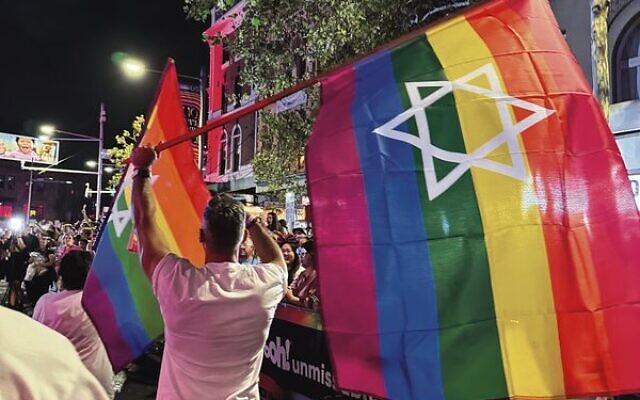Why I marched at the Mardi Gras
I realised how detached I had been from a segment of my own community, and the commonalities of gay and Jewish identity.
Being gay is a lot like being Jewish. This was a thought that came to me about a month ago. I had received a call from a journalist seeking comment on a story about the Sydney Gay & Lesbian Mardi Gras. The CEO of the Mardi Gras had penned an open letter to the Prime Minister urging him to support an immediate ceasefire in Gaza.
I could give a line-by-line analysis of the statement, why referring in one breath to LGBT rights in Israel and Palestine is like talking about the rights of schoolgirls in Afghanistan and Bellevue Hill, but this isn’t really the point. I told the journalist that before commenting I first wanted to speak to the leadership of the LGBT Jewish community to see how they interpreted the letter to ensure I took into account their perspective and not merely a perspective I gratuitously attributed to them. I called the president of Dayenu, a group that provides support and advocacy for LGBT+ people in Sydney. I became aware of the scale of the outrage that was developing, and in that heightened state of empathy, of what it must be like to be both gay and Jewish.
I learned that the open letter had caused some consternation, but the greater issue was a group called Pride in Protest, ostensibly a hard-left band of activists, the types that play the sounds of pigs getting slaughtered in non-vegan restaurants and chain themselves to fire hydrants out of an affinity for the colour red. Pride in Protest were trying to get the Dayenu float kicked out of Mardi Gras. There was also talk of clashes if the float went ahead.
It was during the course of that conversation that I realised how detached I had been from a segment of my own community, and the commonalities of gay and Jewish identity.
In speaking to David, the Dayenu president, I realised I was performing some weird manoeuvres of self-editing out of an earnest desire to not cause offence. Can I say “gay” or do I have to say “gay and lesbian”? Do I refer to these people … definitely mustn’t say “these people” … as a community or does that imply they are not a part of the Jewish community and belong to another community altogether? I instantly remembered the time I was speaking to a non-Jew about being Jewish and was acutely aware of the fellow’s mental exertions in avoiding the word “Jew” or even “Jewish”, which finally led him to emit the truly outstanding formulation, “people of the Jewish persuasion”.
Many Jews go through a process of “coming out” to new friends and colleagues. When they do, the reactions range from “I know lots of Jewish people. My accountant is Jewish.” To the evergreen, “wow, but you don’t look Jewish.” Now I imagined multiplying that anxiety and doubling the history of exclusion, rejection, murder, forced conversion that I carry as a Jew.
I tapped out the comment for the journalist and sent it to David to see what he thought. He replied: “It brought tears to my eyes.” He now saw me as an ally, which is precisely how Jews react when a non-Jew conveys support. To them it seems natural, but to us it is like a heroic deed by the truly righteous. I had written along the lines that LGBT Jews had overcome immense challenges because of their LGBT identities and now they were facing exclusion because of their Jewish identities. This attack on our brothers and sisters, who are an inseverable part of our community, cannot be allowed to happen. An attack on them is an attack on us all.
Speaking to David in the weeks before Mardi Gras, I was aware of how fearful LGBT Jews were of marching this year. How many had made the decision to stay away. How much trauma they had experienced. And how a band of fanatics was tearing open their wounds with relish. There were police briefings, extraordinary security measures to keep the Jewish marchers safe, including by extracting them from the endpoint of the march as quickly as possible. This was their day. They should have been free to linger and congregate wherever the hell they wanted, march with the pride they fought to express. It took heroism for gays and lesbians to march openly, now it would take guts to be openly Jewish.
When I was offered the opportunity to march alongside them I accepted with no hesitation and with a deep sense of honour. If my presence there could make someone feel more loved, more accepted, more safe, then how could I not?
The expressions of gratitude have been among the warmest and most heartfelt words I have received since October 7. But the gratitude is all mine. I am grateful for having the chance to march. To carry the rainbow Star of David flag through the heart of Sydney. To receive the cheers and kind words from thousands of people who gathered to watch the parade. To hear words like “I support you” and to stare down the very few who jeered. And alongside that gratitude, I felt shame that it took me this long to ask our gay and lesbian brothers and sisters, “what do you need?” and “how can I help?”
Alex Ryvchin is co-CEO of the Executive Council of Australian Jewry.


comments